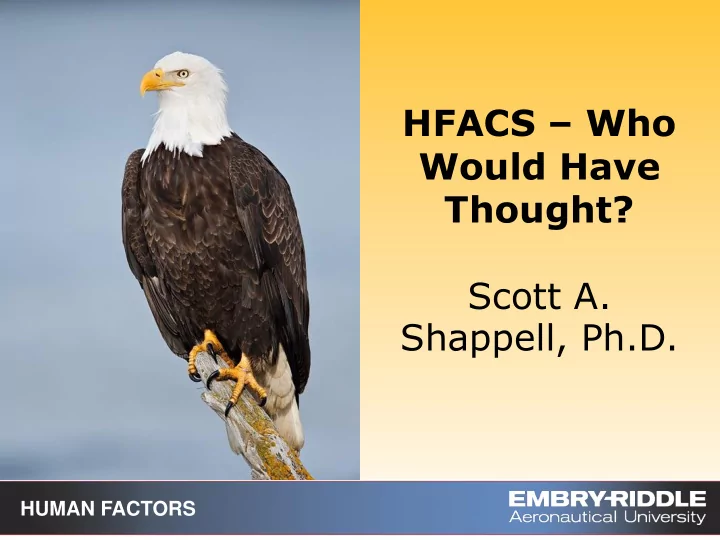

HFACS – Who Would Have Thought? Scott A. Shappell, Ph.D. HUMAN FACTORS
Necessity is the Mother of Invention HUMAN FACTORS
Swiss Cheese Model of Human Error Inputs Organizational Influences Supervisory Factors Preconditions for Unsafe Acts Unsafe Acts Failed or Absent Defenses Accident & Injury HUMAN FACTORS
Modest Beginnings HUMAN FACTORS
Organizational Influences Resource Organizational Operational Management Climate Process Supervision Planned Failed to Inadequate Supervisory Inappropriate Correct Supervision Violations Activities Problem Preconditions for Unsafe Acts Personal/ Environmental Interpersonal Factors Factors Communication Physical Technological Fitness for Condition of Coordination Environment Environment Duty Operators Planning Adverse Physical/ Adverse Physiological Mental Mental States States Limitations Unsafe Acts Errors Violations Decision Skill-based Perceptual Routine Exceptional Errors Errors Errors HUMAN FACTORS
Expansion of HFACS Aviation Military (Shappell & Wiegmann, 2004; Li et al., 2004; Li & Harris, 2006; Guar,2005; Li & Harris, 2007; Gibb & Olsen, 2008; Pagan & de Voogt, 2008; Paletz, 2009; Belland et al.,, 2010) Commercia l (Wiegmann & Shappell, 2001; Shappell et al., 2007; Li & Harris, 2006; Li et al., 2008; Majumdar er al.,2009; Harris & Lee, 2011) General Aviation (Wiegmann et al., 2005; Lenne et al., 2008; Dambier & Hinkelbein, 2006; Guar, 2005; Lenné, et al., 2008; Li, Harris, & Yu, 2008 ) Unmanned Aerial Vehicles (Thompson, 2005; Tvaryanas, Thompson, & Constable, 2006) Aviation Maintenance (Krulak, 2004; Boquet et al., 2004; Rashid et al., 2010) Air Traffic Control (Scarborough, et al, 2005; Olsen & Shorrock, 2010) Non-Aviation Combat Operations (Jennings, 2008) Construction (Garrett & Teizer, 2009) Forensics (Wertheim, 2010) Mining (Patterson et al., 2010) Railway (Reinnach & Vaile, 2009; Baysari et al., 2008; Baysari et al., 2009) Maritime ( Winters & Valaitis, 2005; Celik & Cebi, 2009; Xi et al., 2009; Schröder-Hinrichs et al., 2011) Medical (ElBardissi et al., 2007; Portalur, et al.., 2010) Petrochemical (Koo et al., 2009) Nuclear Power (Kim et al., 2008) HUMAN FACTORS
General Aviation HUMAN FACTORS
General Aviation: Overall Percentage of Accidents Skill-based Errors Decision Errors Violations Perceptual Errors Year Percentages do not add up to 100% HUMAN FACTORS
General Aviation: Fine Grained Analysis (Skill-Based Errors) ERROR CATEGORY OVERALL SEMINAL Frequency (%) Frequency (%) Fatal Non-fatal Total Fatal Non-fatal Total Directional Control 20 (0.50) 2018 (15.2) 2038 (11.8) 9 (0.57) 1326 (17.5) 1335 (14.6) Airspeed 713 (17.9) 1127 (8.5) 1840 (10.6) 302 (19.2) 605 (8.0) 907 (9.9) Stall/Spin 592 (14.9) 753 (5.7) 1345 (7.8) 84 (5.3) 144 (1.9) 228 (2.5) Aircraft Control 654 (16.5) 665 (5.0) 1319 (7.6) 311 (19.8) 429 (5.7) 740 (8.1) Compensation for winds 23 (0.6) 1046 (6.2) 1069 (6.2) 12 (0.8 859 (11.4) 871 (9.5) HUMAN FACTORS
Benchmarking HFACS Tier Number of Precondition Unsafe Organizational Cases Unsafe Act for Unsafe Act Supervision Influence Data Set n n (%) n (%) n (%) n (%) Chinese Military 325 325 (100%) 265 (81.54%) 159 (48.92%) 110 (33.85%) Aviation Chinese Civil 35 35 (100%) 31 (88.57%) 28 (80.00%) 26 (74.29%) Aviation Critical Cases 161 161 (100%) 73 (45.34%) 7 (4.35%) 12 (7.45%) Entertainment 173 173 (100%) 107 (61.85%) 16 (9.25%) 2 (1.16%) 328 (100%) 265 (80.79%) 123 (37.5%) 7 (2.13%) Food Services 328 Maintenance - Field 392 392 (100%) 161 (41.07%) 7 (1.79%) 14 (3.57%) Maintenance - Site 87 87 (100%) 50 (57.47%) 9 (10.34%) 2 (2.30%) 31 (100%) 20 (64.52%) 5 (16.13%) 4 (12.90%) Middle East Aviation 31 Mining - Australian 475 475 (100%) 380 (80.00%) 163 (34.32%) 43 (9.05%) Mining - US 242 242 (100%) 216 (89.26%) 205 (84.71%) 128 (52.89%) Remotely Piloted 48 48 (100%) 43 (89.58%) 22 (45.83%) 38 (79.17%) Aircraft Operations US Commercial 143 143 (100%) 80 (55.94%) 14 (9.79%) 10 (6.99%) Aviation - FAR 121 US Commercial 779 779 (100%) 556 (71.37%) 26 (3.34%) 25 (3.21%) Aviation - FAR 135 US General Aviation - 61 61 (100%) 26 (42.62%) 2 (3.28%) 0 (0.00%) FAR 133 US General Aviation - 761 (100%) 392 (51.51%) 2 (0.26%) 2 (0.26%) 761 FAR 137 US General Aviation - 12516 12516 (100%) 7426 (59.33%) 477 (3.81%) 23 (0.18%) FAR 91 US Gyroplane 158 158 (100%) 103 (65.19%) 4 (2.53%) 0 (0.00%) Aviation Lower Confidence Interval -- 48.61% 1.91% 0.40% HUMAN FACTORS Mean -- 58.13% 7.95% 4.96% Upper Confidence Interval -- 67.65% 14.00% 9.53%
Benchmarking HUMAN FACTORS
Benchmarking HUMAN FACTORS
Benchmarking HUMAN FACTORS
Associations Between Categories HUMAN FACTORS Red – Data not included Yellow – Data sampled
Associations Between Categories Solid blue line – Significant Chi-Square, Odds Ratio, and Lower Relative Risk Dashed blue line – Significant Chi-Square and Odds Ratio Dashed orange line – Significant Chi-Square HUMAN FACTORS
Associations – Tier Jumping Solid blue line – Significant Chi-Square, Odds Ratio, and Lower Relative Risk Dashed blue line – Significant Chi-Square and Odds Ratio Dashed orange line – Significant Chi-Square HUMAN FACTORS
Comparison with other Studies HUMAN FACTORS
Future Directions Medicine • Sentinel Events • Cardiovascular OR Forensic Science • Latent Fingerprint Analyses • Questioned Document Analyses Offshore Oil Drilling • Gulf of Mexico HUMAN FACTORS
Questions? HUMAN FACTORS
Recommend
More recommend